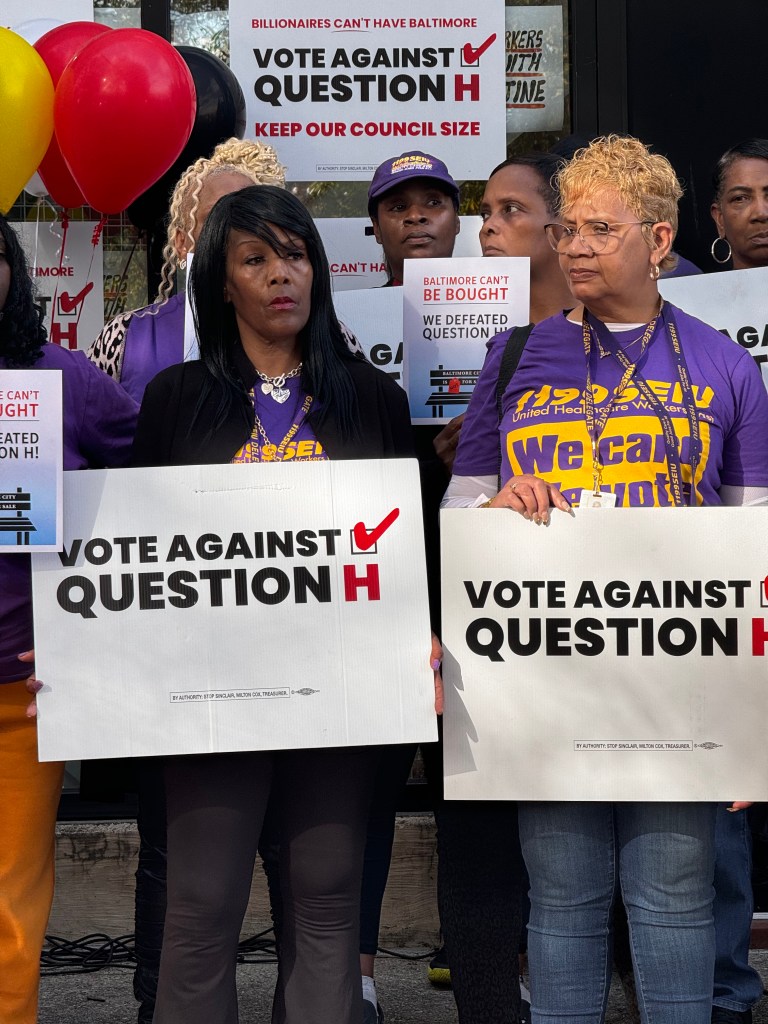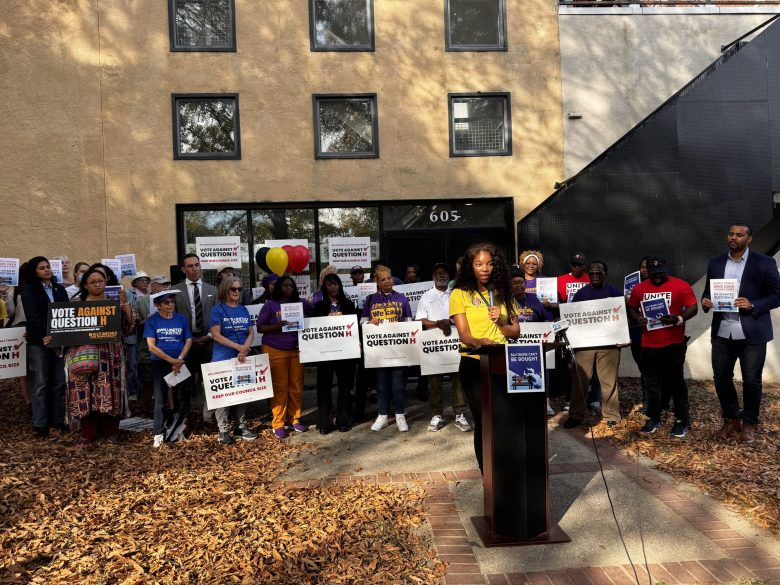At a Nov. 7 press conference in Seton Hill, a coalition of elected leaders, labor unions, grassroots groups, and faith-based organizations chanted “Not for Sale” as they celebrated the defeat of a ballot measure that would have cut the size of the Baltimore City Council by nearly half. Speakers said the defeat of Question H — a ballot measure that was bankrolled by wealthy right-wing media mogul David Smith — could serve as a model for successful local organizing during the incoming Trump administration.
“Not only did we defeat a ballot measure, which is something that rarely ever happens, we stopped a Baltimore County millionaire from carrying out the next steps on his agenda to destabilize power in Baltimore,” said Ricarra Jones, political director of 1199SEIU United Healthcare Workers East, which represents 400,000 members.
Speakers said the defeat of Question H — which was bankrolled by wealthy right-wing media mogul David Smith — could serve as a model for successful local organizing during the incoming Trump administration.
Question H, which proposed reducing the size of the City Council from 14 districts to eight, became the first ballot measure to fail in two decades. Sixty-three percent of voters rejected it, delivering a humiliating loss to Smith, who single-handedly funded the measure with a $415,000 donation.
“We will continue to fight against [measures that] weaken the power of the people and seek to benefit the wealthy and well-connected,” Jones said.

Opponents, who included Mayor Brandon Scott and members of City Council, framed the proposal as part of Smith’s long-running effort to use his wealth and media empire to buy influence in Baltimore City. As the longtime chairman of Sinclair Broadcast Group — one of the nation’s largest operators of local TV stations in the U.S. — and the recent purchaser of The Baltimore Sun, Smith has long faced accusations that his media companies inject conservative ideology and disinformation into otherwise politically neutral local news coverage.
Supporters of Question H argued that reducing the council size would increase the body’s accountability and more efficiently represent the city’s decreasing population. Their efforts, boosted by favorable coverage in local Sinclair affiliate Fox 45, tap into a dissatisfaction towards the city. A 2023 Johns Hopkins University survey revealed nearly 75% of respondents don’t trust their local government.
In response, the Baltimore City Not for Sale Coalition painted Question H as an attack on representative democracy and as part of the power struggle between working people and wealthy conservative donors. Though the coalition was widely outspent, it raised more than $150,000 to oppose the measure, primarily thanks to council members.
Speakers said the victory in Baltimore could serve as a model to resist the agenda of the incoming second Trump administration, armed with Republican control of Congress and poised to slash vital government programs and target vulnerable communities.
Courtney Jenkins, president of the Metropolitan Baltimore Council of AFL-CIO Unions, emphasized the power of collective action at the press conference.
“We proved that when we educate and organize voters, we win.”
Courtney Jenkins, president of the Metropolitan Baltimore Council of AFL-CIO Unions
“We proved that when we educate and organize voters, we win,” said Jenkins.
“This is what it looks like when the grassroots grow. And this is what it will take for us to protect democracy over the next four years.”
At the press conference, speakers said their victory was made possible by a campaign that mobilized 300 volunteers focused on reaching voters in the weeks leading up to the Nov. 5 election.
“Showing up on Election Day at more than 250 polling locations made a real difference,” said Janay Fenner, communications coordinator for Progressive Maryland.
The coalition said it knocked on 3,100 doors, while coalition members from the AFL-CIO, including 1199SEIU, carried the “Vote no on Question H” message to 10,000 households. Progressive Maryland’s canvas reached an additional 22,000 voters.
Coalition members used multiple strategies, including digital campaign and in-person outreach, to reach their goal of engaging 100,000 voters.
Once people heard about it, they were like, ‘Heck, no, I don’t want this.’
Rachel Kutler, Baltimore director of Jews United for Justice
“Once people heard about it, they were like, ‘Heck, no, I don’t want this,’” said Rachel Kutler, Baltimore director of Jews United for Justice. Her team gave presentations at community associations, synagogues, and churches, and canvassed neighborhoods from July through Election Day.
“Organizing works. That is probably my biggest lesson,” Kutler said.
One strategy involved leveraging the widespread disdain many liberal and progressive city residents hold for David Smith, who is known as a major funder of conservative causes, and who many believe is responsible for perpetuating harmful stereotypes through his growing local media empire. Smith’s Fox 45 has been accused of constantly portraying Black youth as violent and Baltimore as a “City in Crisis.”
Studies show local news remains the most trusted and leading source of information for Americans. However, Ashley Esposito, a member of the grassroots group Baltimore for Democracy and an elected member of the Baltimore City School Board, noted that this message did not resonate with all voters.
“The anti-David Smith messaging … was almost offensive to some folks,” Esposito said.
“You’re talking about moderates, conservatives…people of various political leanings. We have to be mindful that we can’t do a one-size-fits-all approach. We have to meet people where they are.”
The coalition recognized that the defeat of Question H is unlikely to deter future attempts by Smith to influence future elections and acknowledged more immediate threats.
“What cannot happen now, as we look ahead to the next administration, is for this coalition to break apart,” said incoming Baltimore City Council President Zeke Cohen.
“We know what’s coming from Donald Trump: an assault on our immigrant communities, on working people, key infrastructure projects like the Key Bridge, the Red Line…. That’s why we are going to stand together as a city and not let anyone take away our democracy.”
Kutler — who previously served as lead organizer of the Baltimore Housing Roundtable, a coalition of housing advocates that previously passed two ballot measures expanding affordable housing — emphasized the need for ongoing coalition work to ensure all residents have their basic needs met, including by ensuring wealthy institutions pay their fair share.
Activists are urging local authorities to negotiate a more equitable Payment in Lieu of Taxes (PILOT) agreement with the city’s 14 largest nonprofit hospitals and universities — several of which generate annual revenues exceeding $1 billion — when the current agreement expires in 2026.
In March, City Comptroller Bill Henry reported that under the city’s current PILOT agreement, the city received $6 million on property valued at over $100 million while the same nonprofits used nearly $50 million worth of city services.
“We know Baltimore has major issues — housing, food access, and more — that we need to work on,” Kutler added.

